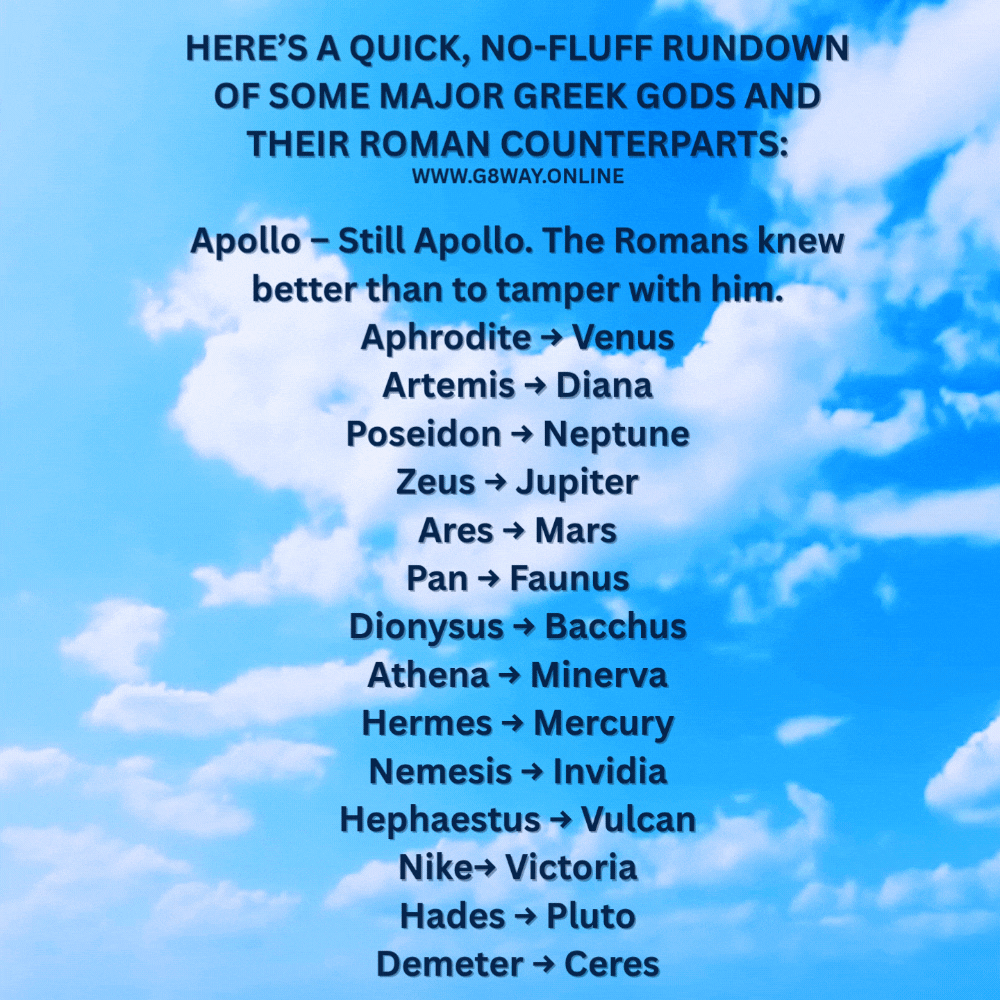Know Your Pantheon: A No-Nonsense Breakdown of Greek and Roman Deities (and Why It Matters)
Many times over, I hear others confusing Deities, mispronunciations or incorrect timeline placement of historical events, reigns, deaths, etc., etc. The gods and goddesses of the ancient Greek Pantheon and Roman Empire eras still "hold weight" in this day and age. Much of that time lives on in our architecture, and language ........Bear in mind that these eras are commonly referred to as: Classical Antiquity and (of course) the Roman Empire.
CLASSICAL ANTIQUITYTHE ROMAN EMPIRE
Lya Brk Ujv
7/2/20252 min read
This post is for your knowledge and to make damn sure you can hang with any mofo that brings this up next time. As you all can denote, the Republic died not with a bang, but with applause for Augustus. Chile, ponder as to whether that was meant for Octavian Augustus or Romulus Agustus, because there's this lil 450-year gap I'd like to address...."The Republic didn’t die with a bang — it died to the sound of clapping for Augustus. Now, chile… were they clapping for Octavian Augustus (the first emperor) or Romulus Augustulus (the last)? ‘Cause there’s a whole 450-year mess in between that y’all love to skip over."
With that stated, time and time again, I hear people mix up deities, butcher pronunciations, or completely misplace historical events. Listen—if you're going to talk about ancient civilizations, at least know your shit. The gods and goddesses of the Greek and Roman eras didn’t just disappear after a few dusty scrolls. They’ve echoed through the centuries, alive in our language, architecture, philosophy, and even pop culture.
For instance, we get the concept (and word) of 'democracy' and the legendary 'Marathon' from the Greeks. The word 'triumph'? Thank the Romans. 🏛️ See? You’ve already been worshipping at the altar of Classical Antiquity without even knowing it.
These two pantheons overlapped heavily due to Rome’s admiration (and eventual cultural absorption) of Greek art, mythology, and religion. And for the record: Apollo being untouched across both cultures is a sign of how deeply revered—and feared—he was.
But Let’s Be Clear—These Were Civilizations, Not Cavepeople
These were *civilized* societies. Structured meals, fermented fish sauce (garum), feta cheese, extensive olive oil usage, and wine-drunk philosophical debates? That’s not savage behavior, that’s -sophistication-. The Greeks laid the intellectual foundation; the Romans built the empire—literally and linguistically.
On that note, a Roman language refresher:
Romans spoke Latin, but not the hoity-toity “dead language” Latin you hear in academic circles. Most common folk spoke Vulgar Latin, which eventually evolved into the modern Romance languages. The Italian we know today stems from a Tuscan dialect—specifically Florentine, thanks to literary badasses like Dante.
Greeks, on the other hand, were multilingual within their own region. While they had dialects (Doric, Ionic, Aeolic, Attic, etc.), they still understood one another. Their shared culture made sure of it. Rome had the reach, but Greece had the roots.
Final Thought: Don’t Be That Loud, Wrong Person
In a world where you can Google the Pantheon in under ten seconds, there’s no excuse to sound like a bumbling fool. If you’re going to talk Ancient This or Mythological That, at least toss in a few solid facts. Flex a little knowledge muscle. At the very least, be ready to impress your friends—or shut down that one dude who thinks Hercules is just a Disney character. Say it with your chest. Drop names. Cite history. Because if you know, you know. And now? You do. 😉


Eclectic Occultist
G8WAY intellectual property found herein is branded as such and most graphic interchange formats along with all links lead to external businesses not owned or operated by G8WAY. If you own any image included here and wish to request its removal or proper attribution, please contact admin@g8way.online and G8WAY will respond promptly. Please note: a page’s presence in G8WAY does not imply it is complete. Each entry is a living document that may be subjected to editorial corrections and/or additions. G8WAY may earn a commission when users make a purchase through links posted throughout this site. Information on WWW.G8WAY.ONLINE is for informational purposes only and should not be considered professional advice. Thank You for Visiting! G8WAY.ONLINE ©2025 All rights reserved.
